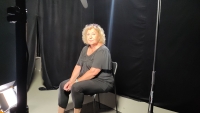Mgr. Ľubica Blaškovičová
* 1955
-
"It's strange that the kids experience it like a movie. It couldn't even be reality, I didn't even perceive it as something that I should be very afraid of. It was something so surreal, incomprehensible that something like this could even happen and you see. I don't think those people even screamed, I don't remember that they screamed. I remember that we were all just in shock. We were looking at what was going on and who was walking here. And you feel , that yes, that everyone has those bare hands and wide eyes and you don't know what to do."
-
"Well, of course, there was the Občianske fórum, because Marcel Strýko had contacts in Prague and communicated mainly with the Prague dissident and communicated with Václav Havel's entourage, so the first information from Prague arrived much faster than from Bratislava, and when the VPNka was established in Bratislava, so the the Občianske fórum was created and after some 2 - 3 weeks they convinced us that you can't be the Občianske fórum and you have to be a VPN. I say fine, but how are we going to explain it to those people? We had a big Občianske fórum banner there, so we added a dash of VPN there. Well, of course, after some time, the Občianske fórum was no longer there, it just completely switched to VPN. Before the elections, changes were made to call it VPN? But it wasn't this, it was earlier , this was already in the spring of 1990, actually when the VPN started to emerge as a movement, as an organized movement, and then it was preparing the first independent elections. I have a feeling that it seemed like such a wrong to us that we were pressured by Bratislava to do something, what we didn't even want to. We had to accept it. I think that Košice was really different in that we were closer to Prague and we didn't like the Bratislava practices, and we didn't like the fact that Bratislava suddenly got the feeling that they should lead us. We said to ourselves, what should they lead us to? Just as the train of the Velvet Revolution came to open the eyes of the East so that we are not afraid and that we stand here in the squares every day. We solved everything that needed to be solved a long time ago, so why should he suddenly lead us and command us?"
-
"It was in front of the science library by the lower gate, they wouldn't let us on the balcony. There were some cables and wooden steps built below the balcony, and it was very small and we were all afraid that someone would fall from there, but I remember that everyone there wanted to speak. It was really quite difficult to manage those people, because to many of people suddenly got courage and wanted to say at least a few sentences. Then the meetings were very long, those people were willing to stand there in that terrible winter, just of course because we are professional actors, one realizes that it must have a certain dramaturgy, a certain gradation, simply, when a teacher is heard there, the worker, the student, and the Christian democrat must also get an opportunity. . In a way, not to provoke those people, not to provoke so that something doesn't happen, but to stir up that energy, that positive energy, that the heaviness that had accumulated there for those decades, because those meetings really were a valve. That was one huge euphoria. It's interesting that as much negativism as those people had in themselves, that anger and hatred over the years turned into something incredibly positive."
-
Celé nahrávky
-
Tabačka Košice, 23.06.2022
(audio)
délka: 02:23:39
Celé nahrávky jsou k dispozici pouze pro přihlášené uživatele.
In our case, the revolution ate its own children
Ľubica Blaškovičová was born on August 16, 1955 in Nitra. She born to a Moravian-Slovak family, her father was a famous actor. She graduated from the Academy of Performing Arts in Bratislava and in 1978 started working as an actress in Košice, where she has been working until now. Her husband was the actor and director Peter Rašev. In 1989, they spontaneously joined the students who organized meetings during the Velvet Revolution in Košice. She was a candidate for the deputy of the Košice Staré mesto district, which she has been continuously since 1990 until today. In 1996, due to an unjust regime, both and her husband were fired from the State Theater in Košice. At that time, they founded the Old Town Theatre. In 2001, she returned to the State Theater in Košice and still works there today.
